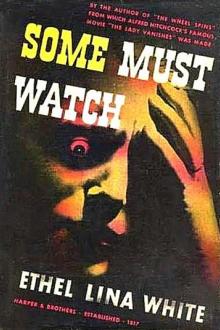Some Must Watch - Ethel Lina White (best book club books .TXT) 📗

- Author: Ethel Lina White
- Performer: -
Book online «Some Must Watch - Ethel Lina White (best book club books .TXT) 📗». Author Ethel Lina White
which might lurk behind the next second.
“This,” replied the Professor, as though he were demonstrating a thesis.
“I could have got rid of—interference—by exercising my ingenuity. It
presented quite a pretty mental problem. But my knowledge of human
nature prompted a subtler—and simpler—method… To begin with, I
tipped Rice of a dog for sale. When he brought it home, I knew I had
several members of the household tied to the same string.”
“Go on, do,” gasped Helen, thinking only of the passage of time.
“Need I explain?” The Professor was impatient with her stupidity. “You
saw how it worked out, according to plan. I counted on my sister’s
cowardice and aversion to animals, also on each dominant passion
asserting itself.”
“It sounds very clever.” Helen licked her dry lips as she strove to
think of another question. “And—and I suppose you left the key in the
cellar door, on purpose?”
Again the Professor frowned, in irritation.
“That explains itself,” he said. “It is obvious that Mrs. Oates would
find a way to get rid of her husband.”
“Yes, of course… Did you count, too, on Nurse Barker running
away?”
The Professor made a wry face.
“Ah, there, I confess my plan broke down,” he said. “I calculated that
you, in your impulsive folly, would clear her from the board. You let me
down. I had to do my own preliminary work.”
He spoke almost like a schoolmaster rebuking an idle pupil.
Helen knew that there was one word she must not mention; yet in her
anxiety to know Nurse Barker’s fate, she risked its implication.
“How?” she asked. “Did you hurt her?”
To her relief, the Professor began his explanation calmly.
“Only temporarily. She is gagged and bound, under her bed. She must
remain, as a witness, to testify that she was attacked from behind, by
some unseen assailant, and that I was unconscious, during, during–”
His tone blurred, and his mind seemed to lose grip. To Helen’s horror,
she saw that his fingers were beginning to twitch.
“Why did you turn the Police away?” she asked with the desperate feeling
that she was trying to feed a furnace with flimsy sheets of
tissue-paper.
“Because they will pay me a visit, tomorrow.” Again the Professor’s
fingers curled. “Their time will be wasted. Yet no clever man underrates
the intelligence of others. During two visits to the same house, they
might notice some trifle which I have overlooked… But we are
wasting time.”
Helen knew that the moment had come. It could be staved off no longer.
The house was locked, so that she had no hope of, rescue. Yet she asked
another question.
“Why do you want to kill me?”
Perhaps, in some unconscious way, the Professor’s theory was being
demonstrated, in that tense interlude. Just as it was in Helen’s nature,
to explore, his own instinct was to satisfy any wish for knowledge.
“I consider it is my duty,” he told her. “I have a scientist’s dread of
an ever-increasing population and a shrinking food supply. Superfluous
women should be suppressed.”
Helen did not know what she was waiting for, when the end was so
certain.
“Why am I superfluous?” she asked wildly.
“Because you have neither beauty, nor brains, nor any positively useful
quality, to pass on to posterity. You are refuse. Unskilled labor, in an
overcrowded market One extra mouth to feed. So—I am going to kill
you.”
“How?” whispered Helen. “Like the others?”
“Yes. It won’t hurt you, if you don’t resist.”
“But you hurt Ceridwen.”
“Ceridwen?” He frowned at the recollection. “I was disappointed. I was
waiting for you… She gave me trouble, for I had to carry her over
to Bean. I did not want the Police coming here. An unnecessary fatigue.”
Helen stood her ground, as the Professor advanced a pace. She had the
feeling that any sudden action might touch the spring, which unloosed
that ghastly transformation.
He, for his part, seemed in no hurry to begin. He looked around him,
with an air of satisfaction.
“We are quiet here,” he said. “I am glad I waited… I was on the
point of doing it, three times, this evening. In the plantation—when
you were asleep, on the stairs—and when you were alone in your room.
But I remembered that there might be interference.”
He rubbed his fingers reflectively, as though massaging them.
“This is hereditary,” he explained. “When I was a boy I saw my father
cut a girl’s throat, with a dinner knife. At the time I was sick, and
filled with actual horror. But, years later, the seed bore fruit”
A green light was glowing behind his eyes. His face was melting into
unfamiliar lines—changing before her eyes. Yet Helen recognized it!
Before her floated the seared face of evil desire.
“Besides,” he added, “I like to kill.”
They stood, facing each other, only divided by a few yards. Then,
frantic with terror, Helen turned and rushed into his bedroom.
He followed her, his features working and his fingers hooked into claws.
“You can’t escape me,” he said. “The door is locked.”
Filled with the panic of a coursed creature, Helen broke away from him.
She did not know who she was—or where she was—or what she did. All
around her, and within, was noise and confusion—a reeling red mist—a
sound like the crack of a whip.
Suddenly she realized that the end had really come. She was penned in a
corner, while the Professor closed her in. He was so near that she could
almost see her reflection mirrored in his eyes.
But, before he could touch her, his body sagged, though some vital
spring had snapped and he crashed heavily down upon the carpet, and lay
still.
Looking up, Helen saw Lady Warren standing in doorway, holding a
revolver in her hand. She wore white fleecy jacket of a nice old lady,
decorated with rose ribbons. One gay pink bow dangled at the end of a
spike of grey hair.
As the girl reached her, she collapsed in her arms. The effort of her
shot had been too great. Yet she smiled with the grim satisfaction of a
sportsman who had exterminated vermin, although her last words expressed
a certain regret.
“I’ve done it… But—fifty years too late.”





Comments (0)